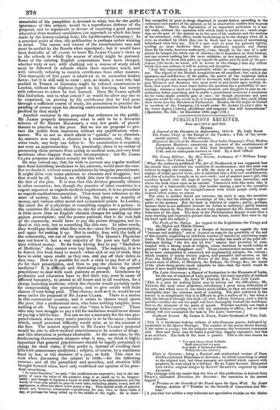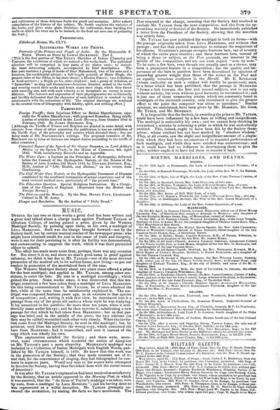PUBLICATIONS RECEIVED,
From April 14th to April 20th.
Boons.
A Journal of the Disasters in Afghanistan, 1841-2. By Lady SALE. The Pastor Chief, or the Escape of the Vaudois; a Tale of the, seven, teenth century. In three volumes. Historical Record of the Honourable East India Company's First Madras European Regiment: containing an Account of the establishment of independent companies in 1645, their formation into a regiment in 1744 and its subsequent services to 1842. By a Staff Officer.
The Young Milliner. By Mrs. STONE, Authoress of " William Lang- shawe, the Cotton Lord," &c. [When the authoress published The Art of Needlework, it was suggested that she should have exhibited the condition of needlewomen; and this book Was written to supply the omission. It tells the story of a young and friendless orphan, of rather genteel birth, who is admitted into a first-rate establishment, and dies of a decline brought on by over-work ; and of another poorer girl, who sacrifices herself with the hope of saving her mother from starvation and whom the book closes upon as an outcast. Connected with this main tale, is the story of a fashionable family, that besides bearing a part in the narrative is partly. used to show the thoughtlessness with which people really kind- hearted Inflict misery on others. The story is neither forced nor extreme; the style is easy, the narrative rapid ; the characters exhibit a knowledge of life; and the dialogue is appro- priate to the persons. But the book is deficient in matter; partly, perhaps, because there is not sufficient interest for fiction in millinery; partly because the cases chosen by Mrs. STONE do not truly represent the life, character' and behaviour of the class. The facts in the Parliamentary Report would form a more startling and impressive picture than any fiction, unless Boz were to try his hand upon the subject.] The Perils of the Nation. An Appeal to the Legislature, the Clergy, and the Higher and Middle Classes. [The author of this volume is a disciple of SADLER as regards the text "increase and multiply," and of ALlsos as respects the possibility of the lima of this country supporting an indefinite number of mouths by cultivating waste lands. With these economical principles the author has much of the good old- fashioned feeling, "the live and let live" maxim that prevailed of yore, coupled with a strong sense of religion, whose doctrines he would reduce to practice "after the straightest sect.' These characteristics animate, and so far as mere composition is concerned, not unpleasantly animate, the volume; which consists of nearly twenty papers, half-pamphlet half-sermon, on the Poor, the Selfish Principle, the Errors of the Day, with addresses on the present state of affairs, to Ministers, the Bishops, the Clergy, &c.; the moral of the whole being pretty much reducible to this—that the world would be better if men would behave better.] The Latin Governess; a Manual of Instruction in the Elements of Latin, for the use of teachers of Latin generally, but more especially of mothers and governesses. By Jour; W. FREESE, B.A., Trin. ColL Camb. [This is a plan for making Latin easy by leaving out the difficulties ; Mr. FREESE, like most other projectors, introducing a great many difficulties of his own, and which seem to our minds much harder, as they are certainly less intelligible, than the common mode of teaching. The Jilin' exhibited in the lessons is so complicated that it is difficult to give a notion of it ; but when a lady has laboured through this book—if, after infinite drudgery, such a feat ia possible—neither she nor her pupil will have thoroughly learned the accidence, that is, the elements of the parts of speech. Whether anybody can teach a language without acquiring it, we will not undertake to affirm; but we think nobody will ever accomplish the task by The Latin Governess.] Gathered Leaves. By JAMES A. PAGE, Under-Graduate of Trin. Coll. Dublin.
[This is a handsome-looking volume of miscellaneous poems, dedicated by permission to the Queen Dowager. The number of the poems shows fluency, if the writer is young ; but the subjects are common, the treatment commoner still. Here and there may be found a good idea, happily expressed ; but this is an accident. The bulk of the book is puerile. This is the best stanza we have met-
" The spot where silent Solitude Math placed her icy seat.
And starts if hams foot intrude.
Within her lone retreat.]
Hints to Servants : being a Poetical and modernized version of Dean Swift's celebrated Directions to Servants ; in; which; something is added to the original text, but those passages are omitted which cannot with propriety be read aloud in a kitchen. By an Upper Servant. Illustrated with twelve original designs by KENNY MEA.DOWS, engraved by JOHN JACKSON.
[The titlepage tells the reader that the idea of this publication is derived from Swrrr's celebrated Directions for Servants : the execution is the merest doggrel.] A Treatise on the Growth of the Peach upon the Open Wall. By Jong Serra, Author of " Treatise on the Growth of Cucumbers and Me- lone."
[A practical but neither a very elaborate nor speculative treatise on the choicer
PERIODICALS.
Edinburgh Review, No. CLVI.
ILLUSTRATED WORKS AND PRINTS.
Portraits of the Princes and People of India. By the Honourable E. EDEN. Drawn on Stone by LOWES DICKENSON. Part I. rThis is the first portion of Miss EDEN'S Sketches of Indian Character and 'Costume, the exhibition of which we noticed a few weeks hack. The published selection will be comprised in four parts of six plates each ; to include the most interesting subjects, accompanied by brief descriptions. The first part contains a group of heads of Host Mahommed, two of his sons and a kinsman, his confidential adviser; a full-length portrait of Shere Singh, the present ruler of the Sikhs' in his state-dress; a Hindoo Fakeer ; two Jemadars, or head-servants ; a Rajttll on his state-elephant, and a group of Alkalees, or " Immortals" as they call themselves—ferocious fanatics, armed to the teeth, and wearing round their necks and heads sharp steel rings, which they throw with unerring aim, and with such velocity as to decapitate an enemy at some distance. The features and expression of their physiognomies are so distinctly and forcibly delineated that the character of each individual is marked in his countenance with the animation of life. The original drawings are rendered in the neutral tints of lithography with fidelity, spirit, and striking effect.]
PAMPHLETS.
Foreign Tariffs ; their Injurious Effect on British Manufactures, espe- cially the'Woollen Manufacture; with proposed Remedies. Being chiefly a series of articles inserted in the Leeds Mercury, from October 1842 to February 1843. By Jesus BISCHOFF, Esq.
(Although the Tariffs of France and Belgium are printed in some detail, with extracts from those of other countries, the publication is less an exhibition of the Tariffs than of the principles and animus which dictated them ; free use being made of Mr. MACGREGOR'S writings. The proposed remedies of Mr. BISCHOFF are to relax or increase our import-duties acccording to the tariffs of other countries.] Corrected Report of the Speech of Sir George Staunton, on Lord Ashley's
• Motion on the Opium Trade, in the House of Commons, 4th April 1843. With introductory Remarks and an Appendix.
The Water Cure: a Lecture on the Principles of Hydropathy, delivered before the Council of the Hydropathic Society, at the Rooms of the
• Society of Arts, London, 23d March 1843, by EDWARD JOHNSON, Esq., M.D., Author of "Life, Health, and Disease," on his return from Grtefenberg.
The Cold Water Cure Tested; or the Hydropathic Treatment of Diseases established by the combined testimonies of actual experience and of the most eminent medical men, particularly of " the present time."
The Education Question. Special Religious Instruction. By a Clergy- man of the Church of England. (Reprinted from the British and Foreign Review.) The Distress and the Remedy. By the Hon. HENRY FANS, Lieutenant- Colonel in H. M. Army.
Hunger and Revolution. By the Author of "Daily Bread."
and cultivation of those delicious fruits the peach and nectarine. After a short compilation of the history of the subject, Mr. Smith explains the varieties of the fruits, and gives some plain directions for cultivation, from building the walls on which the trees are to be trained, to the final act save one of gathering the fruit.]



























 Previous page
Previous page